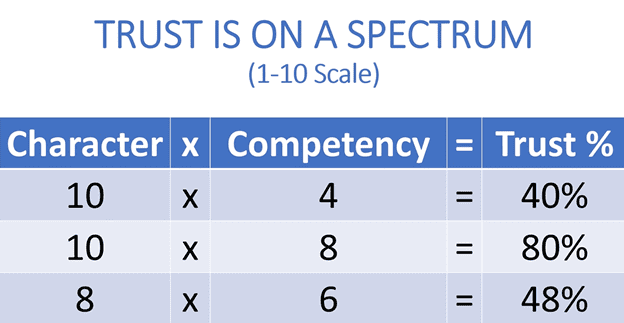Do you trust your appraisers? How about your reviewers and staff? How much do you trust them?
Trustworthy is being accountable, not perfect.
If you’re a reviewer, the first thing you do is look who wrote the appraisal. It’s a quick test to determine if you trust the report. As a fee or bank appraiser, consider following U.S. Army Colonel Jimmy Blackmon’s mathematical trust equation. It’s simple and brings confidence.
Character x Competency = Trust. Do the trust math with your fee appraisers and reviewers. It’s surprising how one category can drop your collective Trust Score substantially. Do this math with your staff, clients, vendors and software providers.
If you don’t trust someone, you may experience a range of negative emotions such as suspicion, doubt, anxiety, fear and uncertainty. You may feel like you can’t rely on the person or company and may be guarded or defensive.
Other feelings might include a sense of betrayal or disappointment if the person has acted in a way that violates your trust. The feeling of not trusting someone can be uncomfortable and can create a sense of tension or unease in a relationship.
Hire for character, teach competency
Colonel Blackmon’s speech at a local Vistage meeting was amazing. It included a firsthand account of the author’s experience at the U.S. Army Ranger School, one of the most challenging leadership and small tactics courses in the world. He shared his insights into leadership, teamwork and overcoming adversity. The colonel talked about trust, especially important in life or death situations.
Trust is important because it allows us to feel safe and secure, knowing that we can rely on others to do what they say they’ll do. It also helps us to build strong relationships with others, as we feel comfortable sharing our thoughts and feelings with them. Trust is essential that allows us to work together towards common goals for your appraisal firm or department.
5 ways to build trust
- Transparency: Be honest and let others know what you’re thinking and feeling.
- Keep your promises: Do what you say you’re going to do.
- Be reliable: Be there for others when they need you.
- Be open-minded: Be willing to listen to others and consider their perspectives.
- Be forgiving: Everyone makes mistakes. Be willing to forgive others and move on.
Trust is a performance multiplier
- Increased productivity: When people trust each other, they’re more likely to collaborate and share information, which can lead to increased productivity.
- Improved decision-making: When people trust each other, they’re more likely to share their ideas and perspectives, which can lead to better decision-making.
- Stronger relationships: Trust is essential for building strong relationships with others. When we trust someone, we feel comfortable being ourselves around them and sharing our thoughts and feelings.
- Reduced stress: Trust can help to reduce stress levels, as we know that we can rely on others to help us when we need it.
- Increased happiness: Trust can lead to increased happiness, as we feel more connected to others and more secure in our relationships.
Trust is a precious commodity. It takes time and effort to build, but it can be easily broken.
Building trust comes from predictable and consistent interactions over time.
Lead with trust, it’s an essential trait of successful appraisers.
Trust is the new currency.





